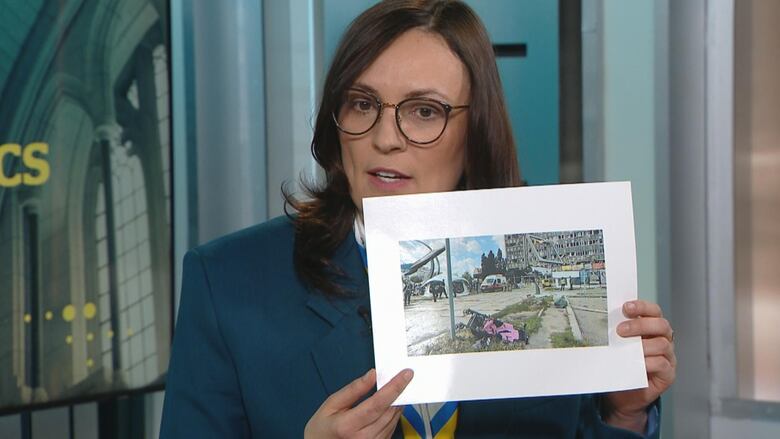Ukraine's ambassador slams Canada for Airbus sanctions waiver on critical Russian mineral
European aerospace giant Airbus granted waiver on the use of Russian titanium in aircraft parts

Canada's decision to grant European defence contractor Airbus a sanctions waiver on the use of Russian titanium in its equipment has drawn a sharp, emotional response from Ukraine's ambassador.
Appearing on CBC's Power & Politics, Yuliya Kovaliv held up a photo of the aftermath of a Russian Kalibr missile strike two years ago where a child was killed, which shows emergency crews in the background of an overturned stroller, saying the critical mineral is used in the manufacturing of not only the supersonic rocket but other major warplanes.
Allowing western companies to continue to use Russian titanium is only feeding the Kremlin's war machine, she said.
"It's very disturbing," Kovaliv said Wednesday, adding she had reached out to Global Affairs Canada for an explanation but had not yet received one.
Reuters first reported that Canada had granted the waiver and quoted the company as saying, "Airbus is aware of the Canadian government imposing sanctions on [the Russian company VSMPO-AVISMA] and has obtained the necessary authorization to secure Airbus operations in compliance with the applicable sanctions."
Airbus operates manufacturing facilities in Ontario and Quebec.
Speaking to reporters on Thursday, Foreign Affairs Minister Mélanie Joly said Canadian jobs were the main concern when it came to granting the waiver.
"We will always make sure to put maximum pressure on the Russian regime and meanwhile protect our jobs here at home. We can do that together," she said.
The sanctions on Russian titanium, which because of its light weight and strength is used in the manufacturing of aircraft engines, were introduced in February. Canada was the first western nation to target Moscow's export of the critical mineral.
As much as $13 billion US was added to Moscow's war chest by the export of minerals, such as titanium.
That's more than the combined military and economic support Canada has given to Ukraine since the full-scale invasion began two years ago, Kovaliv said.

Russia's VSMPO-AVISMA, based in Verkhnyaya Salda, is the world's largest producer of titanium.
Other nations, such as China, Kazakhstan and Japan, have large production capacity and potential. Canada also has an abundance of the critical mineral.
Not long after the full-scale invasion of Ukraine, Airbus rival Boeing swore off Russian titanium and cancelled a long-standing contract with the Russian giant.
Almost a year and a half ago, Airbus pledged to do the same.
"We are in the process of decoupling from Russia when it comes to titanium. It will be a matter of months not years," Michael Schoellhorn, chief executive Airbus Defence & Space, said in December 2022.
Airbus had 2 years to find new supplier
Kovaliv said two years is "totally enough time" for the company to have found alternate sources of the strategic mineral.
Ukraine initially applauded Canada's decision to impose penalties.
"This is the huge Russian military support of the conglomerate which Ukraine was advocating for months and years that they need to be sanctioned," she said.
Other countries have been careful not to tread into this area because titanium is used in so many defence products, and it is woven throughout the supply chains globally.
Analysts have suggested the vast majority of Canadian companies have yet to fully understand the ramifications of this set of sanctions.
A FAQ answer published by Global Affairs Canada a few weeks ago said the use of third party materials would trigger the sanctions.


